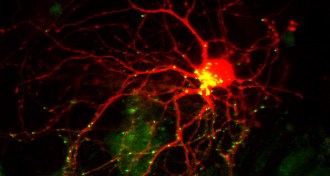Life
Sign up for our newsletter
We summarize the week's scientific breakthroughs every Thursday.
-
 Life
LifeFruit-eating fish does far-flung forestry
Overfishing may be robbing trees in the Amazonian floodplain of vital seed dispersers.
By Susan Milius -
 Plants
PlantsFrom a mismatch in growth, a flower blooms
Scientists reveal the forces at work in the blossoming of a lily.
-
 Life
LifeGenes & Cells
The genetics of wrinkly dogs, plus cancer killers and diabetes thwarters in this week’s news.
By Science News -
 Life
LifeComputer chips wired with nerve cells
Experiments could lead to ways of melding minds with machines.
-
 Life
LifeIn evolution, last really can be first
By tracking bacteria for thousands of generations, researchers show how small DNA changes can eventually put underdogs on top.
-
 Life
LifeDon’t trust any elephant under 60
Herds with older leaders are more attuned to danger, a study finds.
By Susan Milius -
 Life
LifeAntibiotics may make fighting flu harder
The drugs kill helpful bacteria that keep the immune system primed against viral infections.
-
 Paleontology
PaleontologyNew dinosaur species is titanic
Titanoceratops may be the oldest known member of the triceratops group.
By Susan Milius -
 Life
LifeGenes & Cells
A new type of intestinal cell is discovered, plus nuclear fallout and a new Parkinson's culprit in this week's news.
By Science News -

-
 Chemistry
ChemistryLight-sensor pulls perplexing double duty
A long-studied eye pigment appears to also detect temperature, a study in fruit flies shows.
-
 Life
LifeLife
Chimps are righties and orangutans lefties, plus singing mice and chilly dinosaurs in this week's news.
By Science News